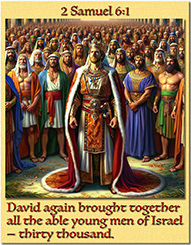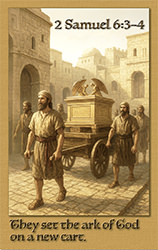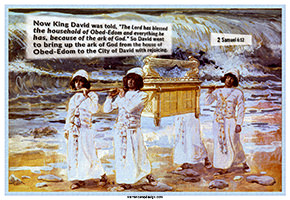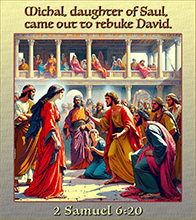2 Samuel 6:1–23 . . . Bible Study Summary with Videos and Questions
“The Ark Brought to Jerusalem”
Chapter 6 begins the second movement in this book wherein we’ll see the results in David’s life when he comes to his full authority within the kingdom. His first concern will be to bring back the ark of God, which was the Ark of the Covenant that God commanded Moses to make more than 400 years before David’s time. In First Samuel, we learned that the ark had been captured by the Philistine tribes who’d taken it and tried to set it up in their temple. But when the ark of God stood opposite Dagon — the staring-eyed, ugly, grotesque fish god of the Philistines — Dagon couldn’t stand it; he fell flat on his face, ending up with a broken neck. The Philistines realized they couldn’t get away with trying to keep Israel’s ark of God in their own temple so they sent it to another city where it remained until David became king over all twelve tribes; then his first concern was to take the ark of God from the Philistines and bring it back into the central life of the nation of Israel.
We'll find in today’s twenty-three verses the author using symmetry to build on David’s two opposing outcomes: (1) his unsuccessful attempt to transport the ark (vv. 1–5) followed by judgment rendered against Uzzah (vv. 6–11) and (2) his successful attempt to transport the ark (vv. 12–19) followed by judgment against Michal (vv. 20–23).
[Note: Click the link to This Week’s Passage near the bottom of this page to read today’s Scripture.]
David’s Unsuccessful Attempt to Transport the Ark (2 Samuel 6:1–5)
Suddenly David remembered that the ark of God embodied the holy rule of Yahweh. He therefore planned to bring the ark to Jerusalem, his city. This wasn’t an idle whim; he brought together “all the able young men of Israel,” as well as representatives from his army, seeking their agreement to a decision to bring back the ark.
The Ark Brought to Jerusalem
6 1David again brought together all the able young men of Israel — thirty thousand. 2He and all his men went to Baalah [Kiriath Jearim] in Judah to bring up from there the ark of God, which is called by the Name, the name of the Lord Almighty, who is enthroned between the cherubim on the ark (2 Sam. 6:1–2).
David wanted to bring the ark into his capital city because it symbolized the LORD’s presence; the assembly agreed with his plans. As we’ve seen in the first half of Samuel, David didn’t believe superstitiously that the ark, for its own sake, would bring blessing wherever it went. Instead, he viewed Yahweh as the genuine source of blessing. However, he wanted the people to see that it was important that Israel’s God should be at the center of national life.
Unfortunately, he didn’t transport the ark according to Mosaic specifications. Instead, he initially transported the Ark of the Covenant on a new cart, following a practice similar to how the Philistines had transported it when they returned it to Israel (cf. 1 Sam. 6:7–8). According to divine instructions in the Torah, the ark was supposed to be carried on the shoulders of the Levite priests using poles inserted through rings on its sides (Exodus 25:12– Numbers 4:15). Such a method symbolized reverence and the sanctity of the ark, emphasizing that it wasn’t to be treated as a mere object or a mechanical burden. In short, David’s initial use of the cart — likely influenced by Philistine custom — was a significant departure from Mosaic law, resulting in divine warning through Uzzah’s death and subsequent correction of the transport method to one of strict obedience and reverence.
We find what went wrong here by going back in Israel’s history, to the time when God gave Israel the Law that included instructions concerning the construction and transportation of the ark. In the following passages, you can find (and ought to now read) the words that God spoke to Moses concerning the tabernacle and the ark of the covenant: Levite priests from the Kohathite clan were to carry it on poles (Exodus 25:14–15; Numbers 3:30–31; 4:1–15) inserted through gold rings, not on a cart; furthermore, no one was to touch the ark or they’d die (cf. Num. 4:15). But things went terribly wrong during the first ark transport incident in today’s passage (vv. 6–7). It’s a striking illustration of the spiritual truth that God’s work must be done in God’s way to secure God’s blessing.
The Israelites and David erred by transporting the ark of God via man’s way instead of God’s. Apparently, David didn’t seek the LORD or read the Torah to learn how the ark should be transported. Rather, the problem was that the Israelites imitated the Philistines instead of obeying God whose instructions in the Law were simply forgotten, rather than willfully ignored or disobeyed. After all, the ark hadn’t been carried for many years, remaining out of circulation, out of use, in the home of Abinadab for a good twenty years — throughout the judgeship of Samuel and the reign of Saul — before it was put back into use (see 1 Sam. 7:2; 14:18–19). It’s easy to see why no one paid particular attention to the instructions given to Israel by God for its transportation from place to place through the wilderness. Besides all this, who’d want to carry the ark by hand when it could simply be loaded onto and transported by an ox cart? Transporting it by cart made sense and was much easier; but it wasn’t the way that God had prescribed.
The reason touching the ark was such a serious matter is disclosed in v. 2 of our text, shown above. In Exodus 25, God told Moses that He’d meet with him and speak to him from above the ark, between the cherubim (25:22). God chose to manifest His presence in the tabernacle, specifically from the ark. When God’s glory first filled the tabernacle, even Moses wasn’t able to enter it (Exod. 40:34–35). After all, sinful men cannot get too close to a holy God.
Judgment Rendered Against Uzzah (vv. 6–11)
No wonder Uzzah was struck dead for having touched the ark: It was holy! It shouldn’t have been touched, for fear of death. By using poles made of acacia wood that were overlaid with gold (Exod. 30:5), Levite priests could transport the ark without touching it, walking in step with each other, giving the ark stability. However, David’s men, having put the ark on that ox cart, made it less stable and more susceptible to stumbling oxen, thus more likely to fall off. Uzzah wanted to prevent the ark from falling so he touched the ark. As a result, Uzzah had to die by God’s hand.
David and those transporting the ark erred in two ways. First, they’d already lost the awe and reverence they should have had for the holiness of God. Second, they’d forgotten the clear instructions for transporting of the ark that God had set down in his Law.
Notice David’s reaction in vv. 8–9. Apparently, David became angry because he expected God to bless his ark-transport efforts. Why was he angry? Perhaps he felt misunderstood: Loving the LORD and wanting Yahweh to be honored within Israel’s capital of Jerusalem, he had the best of intentions. He felt that his motives were right, so why would God bring judgment? Perhaps he felt publicly humiliated: The national celebration he’d planned in front of 30,000 onlookers had ended with disaster, as if God hadn’t approved of moving the ark. In people's eyes, David’s relationship with God had begun to be questioned.
Yes, David was angry but he wasn’t stupid. He sent everyone home, subsequently making arrangements to move the ark to the nearby home of Obed-Edom the Gittite (v. 10). Incidentally, Obed-Edom was a Levite from the Kohathite town of Gath-Rimmon (Joshua 21:20–24). Also, the monument titled Perez Uzzah in v. 8 means “outbreak against Uzzah.”
God saw the need to teach David that obedience is more important than good intentions and religious ritual (1 Sam. 15:22). He learned a lesson about God’s holiness too. He who’d experienced wonderful protection over the years from the LORD his God, and had known unusual intimacy with him, had to come to terms with the fact that he’d overstepped God’s mark by failing to observe the regulations laid down to safeguard full respect for God’s holiness.
David’s Successful Attempt to Transport the Ark (vv. 12–19)
12Now King David was told, “The Lord has blessed the household of Obed-Edom and everything he has, because of the ark of God.” So David went to bring up the ark of God from the house of Obed-Edom to the City of David with rejoicing (2 Sam. 6:12).
When David learned that Obed-Edom had been blessed because he’d kept the [dangerous] ark at his house, he realized that the ark itself wasn’t the problem. He wanted that identical blessing for his City of David! So he instructed the Levite priests, making sure that they first consecrated themselves before this ceremony began (v. 13; image right), according to what had been written in the Torah. This time, David made a concerted effort to do God’s will in God’s way.
It’s interesting that they were rejoicing (v. 15) after their previous aborted celebration, because their initial attempt to bring the ark to Jerusalem had ended in tragedy and divine displeasure due to improper handling of the ark (Uzzah’s death in 2 Samuel 6:6-7). But David knew what he’d done wrong and would now make things right. He and the people demonstrated their strong faith before the LORD; as a result, God honored them for it.
Now David was assured that the nearness of the ark was a blessing. But he also knew that it must be brought to Jerusalem in accordance with God’s directions. So he assembled the Israelites while commissioning the sons of Kohath to carry it, instructing them carefully about the way they were to carry out their duty. The author informs us that after the ark was carried six steps, a sacrifice was offered. Those first six steps were no doubt the most tense steps of the entire journey. After seeing Uzzah die, those nearest to the ark (the Kohathites) were certainly nervous about being so close to that sacred box, indeed, to the presence of God himself. As the journey continued in the proper order, men’s courage and joy must have increased because there was soon great celebration as they made their way to the holy city.
The next act of David the Praise Leader of Israel was to lead his people in their worship procession (v. 14). He was personally absorbed in joyful worship of his God. This wasn’t a formal exercise but a worship from the heart, with arms, legs, and feet. He was dancing and didn’t seem to care that it might appear undignified to some. When David’s wife Michal questioned him about his behavior being below the dignity of a king, he responded: “I will become even more undignified than this, and I will be humiliated in my own eyes . . .” (v. 22). And it wasn’t just a small group of Israelites in this worship procession, but “all Israel” (v. 15). On the first ill-fated journey with the ark, musicians accompanied the ark (v. 5). On the second successful journey, there was a whole host of musicians (1 Chronicles 15:16–24). It was one of the great moments in Israel’s history, a time of celebration, of offering sacrifices, and of feasting (vv. 17–19).
Judgment Rendered Against Michal (vv. 20–23)
It seems that there was only one person in “all Israel” who didn’t or wouldn’t enter into the spirit of rejoicing and celebration, and that person was Michal, David’s wife. Let’s consider what appears to be her perception of this event. She wasn’t a part of the celebration; she was simply a spectator who’d been looking out a palace window, watching the ark arrive in the city (v. 16). The rest of “all Israel” were in the streets. Indeed, “all” had been with the ark from the time it left the house of Obed-Edom. Seemingly not wanting any part of it, Michal didn’t join the ark’s caravan. You might think that she could have made a token appearance with her husband, but she didn’t.
After the celebration ended, David went home to bless his household. Michal had no intention of being a part of this. She proceeded to “rain on David’s praise-and-blessing parade.” She must have been standing in the doorway when David arrived, with her hands on her hips and a scowl on her face. Before he could open his mouth, she presumably vented her anger toward him. What was it she saw or thought she saw that made her so angry? By her own words, she saw a king, a man of position and power, acting like a fool. She saw a man indecently clothed — not naked but dressed in a way that was far below his position — and she was livid about that. Apparently acting like a fool, he’d embarrassed himself, and most certainly her.
Michal wasn’t angry with David for doing something wrong. She was angry with him for behaving like commoners while resembling a lowly priest. She was angry with him because he hadn’t acted like a king while worshiping God. He’d humbled himself; he’d demeaned himself; he’d lowered himself; and Michal wouldn’t forgive David for doing so. If God rained on David’s first parade by striking Uzzah dead, Michal rained on David’s second parade by despising and criticizing him for acting as though he was less than a king.
21David said to Michal, “It was before the Lord, who chose me rather than your father or anyone from his house when he appointed me ruler over the Lord’s people Israel — I will celebrate before the Lord. 22I will become even more undignified than this, and I will be humiliated in my own eyes. But by these slave girls you spoke of, I will be held in honor” (2 Sam. 6:21–22).
David’s words to his wife were strong; perhaps harsh. But that’s because they reflected the wickedness of Michal’s heart. A righteous man couldn’t take her rebuke lightly. David had several things to point out to his wife: (1) His conduct, which Michal found so disgusting, was “before the LORD” (v. 21); (2) he wouldn’t be kept from celebrating, especially when the one whom he sought to please was also the One who’d promoted him; (3) he reminded her that she was acting like her father, Saul, and that it was her husband whom God elevated to king in her father’s place; and (4) he ruled over his people as a humble servant, not as a tyrant.
Apparently, this was David’s response: Because God had made him king, he’d be God’s kind of king. He wouldn’t be a king like Saul, Michal’s father, because God removed Saul, setting aside such a king. God raised up David to be a different kind of king, a servant-king. If that was the kind of king that Michal loathed, so be it; David would be the kind of king that God had enabled him to become. In addition, David identified with the people rather than distinguish himself from them. Even more, he dressed and worshiped God “as a priest” (vv. 14–19).
The passage ends: “And Michal daughter of Saul had no children to the day of her death.” Michal’s barrenness wasn’t necessarily the result of Divine judgment. It’s possible that David never had marital relations with her again. Nevertheless, consider this sobering principle: There’s often barrenness in the life and ministry of the overly critical.
† Summary of 2 Samuel 6:1–23
…by Jan van ’t Hoff at GospelImages
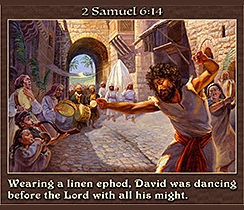
Click to enlarge and download this painting of
David dancing before the Lord
— 2 Samuel 6:14 —
This next passage recounts David’s effort to bring the Ark of the Covenant to Jerusalem, making it the center of worship and God’s presence for Israel. David gathers thirty thousand chosen men to transport the Ark from Baalah (Kiriath-Jearim) with great celebration — music, dancing, and rejoicing (6:1–5). However, when Uzzah reaches out to steady the Ark after an oxen stumbles, God strikes him dead for touching the holy object, leading David to fear the Lord and halt the procession (vv. 6–8). The Ark is temporarily left at the house of Obed-Edom, where God blesses him and his household (vv. 9–11).
After seeing Obed-Edom blessed, David resumes bringing the Ark to Jerusalem, this time with reverent sacrifice and joyful worship, dancing before the Lord “with all his might” and offering generous sacrifices (vv. 12–15). As the Ark enters the city, David’s wife Michal, Saul’s daughter, looks on with contempt when she sees David leaping and celebrating before the Lord (v. 16). David blesses the people, distributes food, and returns home, where Michal rebukes his exuberant worship as undignified. David defends his actions as honoring the Lord rather than seeking human honor, stating he’d be even more undignified to worship God. As a consequence, Michal remains childless for the rest of her life (vv. 17–23).
Key points with verse references:
• David gathers thirty thousand men and leads a celebratory procession to bring the Ark to Jerusalem (vv. 1–5).
• Uzzah is struck dead for touching the Ark, causing David to be afraid and pause the journey (vv. 6–8).
• The Ark is left at Obed-Edom’s house, resulting in God’s blessing on him and his household (vv. 9–11).
• David resumes the procession with sacrifice and worship, dancing before the Lord with all his might (vv. 12–15).
• Michal despises David’s passionate worship; after confronting him, she remains childless (vv. 16, 20–23).
This passage vividly illustrates the holiness of God, the joy and humility required in worship, and contrasting attitudes toward authentic devotion — setting the tone for worship practices in David’s kingdom.
This Week’s Passage
2 Samuel 6:1–23
New International Version (NIV) [View it in a different version by clicking here; also listen to chapter 6 narrated by Max McLean.]
Summary Video: “The Second Book of Samuel”
† Watch this introductory video clip created by BibleProject on bibleproject.com.
- Q. 1 Why did God strike Uzzah dead? Why was David so angry about that?
- Q. 2 How does Michal’s bitterness cause her to misjudge what she sees in David’s behavior?

